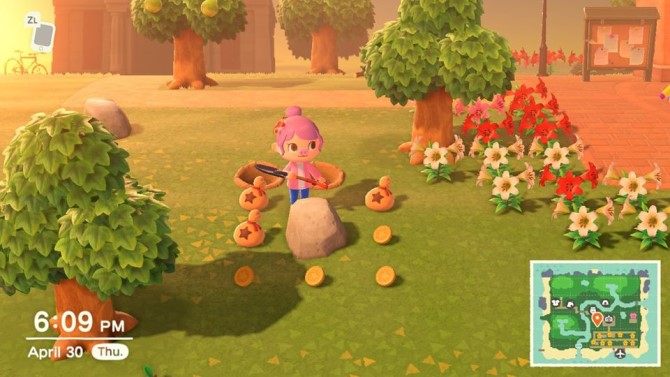Can't afford the upgrade that your island really needs? Don't fret. Animal Crossing: New Horizons offers plenty of bell-making opportunities once you know where to look.
If you want to make some fast bells, use these tips to start maxing out your wallet.
1. Harvest Exotic Fruit Trees

Possibly the easiest, risk-free way of earning bells in Animal Crossing: New Horizons is by shaking non-native fruit trees. That said, if you don't have any exotic fruit on your island, it's worth your time to get some.
While exotic fruit sells for 500 bells, coconuts sell for 250 bells, and native fruit sells for a measly 100 bells. You can find non-native fruit on your friends' islands, on a Mystery Island Tour, and even as a message in your mailbox (usually from Mom).
Once you find and collect several new species of fruit trees, plant as many as you can. That way, you can maximize your profits and make thousands of bells in a matter of minutes.
Just keep in mind that non-native fruit takes four to six days to grow back, so you'll have to find other ways to make bells in the meantime.
2. Catch Expensive Fish

Catching expensive fish is another foolproof method for earning more bells. You'll usually find the most valuable fish in the ocean, rather than rivers.
The only fish worth catching in the river are the golden trout and stringfish—you'll find these species in elevated streams, and they're both worth a whopping 15,000 bells.
Besides that, the ocean is your best bet for pricey fish. I have one rule when it comes to fishing in the ocean: fish only for large and very small shadows. Any medium-sized shadow is usually a horse mackerel, which isn't worth picking up.
When you fish for shadows on the larger size, you're bound to catch tons of sea bass—it gets annoying, but you'll just have to deal with it. Larger fish like the oarfish, red snapper, and tuna go for upwards of 5,000 bells a pop.
You'll also want to keep an eye out for smaller ocean fish too, as the surgeonfish and seahorse are worth about 1,000 bells. That might not seem like much, but there's usually an abundance of these very small fish shadows in the ocean.
If it seems like you're running out of fish to catch, make sure to dig up manila clams to craft fish bait. Throwing some bait in the ocean will cause a fish to spawn immediately.
3. Hit the Money Rock

The money rock has been present in Animal Crossing games from the very beginning. When hitting rocks for ore, you might find rocks that produce bells.
Every day, one rock on your island will produce thousands of bells—you just have to go around hitting rocks to find it.
After you start hitting the money rock, don't stop. You only have a certain amount of time before the rock stops producing bells. If done correctly, you should be able to hit the rock eight consecutive times and earn bells on each hit.
Since you'll move back every time you hit the rock, dig a couple of holes behind you. This prevents you from getting pushed back.
4. Cash in Nook Miles for Bell Vouchers

If you've been hoarding Nook Miles, you should consider exchanging them for Bell Vouchers.
Bell Vouchers become available once you've unlocked Nook Miles+ and upgraded the Resident Services building. You'll find them available for purchase at the Nook Stop Terminal.
For just 500 Nook Miles, you can get one Bell Voucher that you can trade-in for 3,000 bells. You can buy as many as you want, but this process is time-consuming.
Each Bell Voucher comes out of the machine separately, which means you have to go through a series of dialogue boxes and watch the ticket slowly print from the machine dozens of times.
5. Invest in the Stalk Market

Set your alarm clock early on Sundays—Daisy Mae will be walking around your island from 5 am to noon. If she's selling turnips for under 100 bells, buy them. Any price higher than 100 bells isn't always worth the risk.
After that, you'll have the rest of the week to sell these turnips for the highest price. Talk to Timmy and Tommy to find out the current turnip price. You can check back multiple times during the day, as the price will fluctuate.
Try not to sell yourself short. You might even want to consider visiting a friend's islands when their turnip prices are high, and selling your turnips there. Don't hold onto your turnips for too long either—they'll rot and lose value after one week.
6. Attract Peacock Butterflies

Since most common bugs aren't worth many bells, they aren't worth catching and selling.
However, you should keep an eye out for the peacock butterfly. You can easily attract them to your island by creating hybrid flowers that are black, blue, or purple.
Create a garden with these colors, and you'll see an influx of peacock butterflies that are each worth 2,500 bells.
These beautiful bugs aren't available all-year-round—you can find them from March to June in the Northern Hemisphere, and from September to December in the Southern Hemisphere.
7. Land on a Mystery Tour Island

Have some extra Nook Miles to spare? If that's the case, it's time to stock up on Nook Miles Tickets. Sometimes, you'll land on an island that's full of bell-making opportunities.
The standard Mystery Tour Island, usually isn't that impressive. That's why it's important to keep making excursions to find rare island types. If you're lucky, you'll land on an island full of money rocks, gold, exotic fruit, rare flowers, or massive fish.
It's also worth trying to get on tarantula or scorpion island. You can only access these islands from 7 pm to 4 am. This type of island is filled with creepy-crawlers that you can catch and sell for big money.
Making Big Bells in Animal Crossing: New Horizons
Unfortunately, Animal Crossing: New Horizons isn't built for a get-rich-quick scheme. No matter what money-making method you try, you'll still have to put in a little work for those bells.



